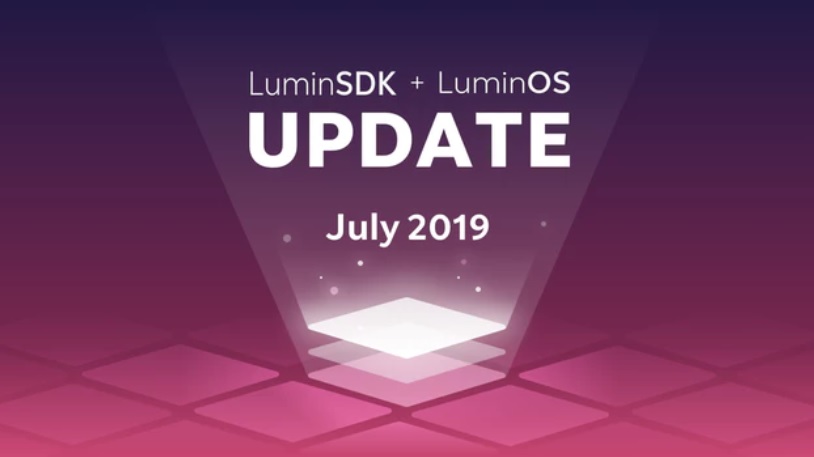 In Augmented Reality and Mixed Reality News
In Augmented Reality and Mixed Reality News
July 25, 2019 – Magic Leap has announced the release of Lumin OS version 0.97 and Lumin SDK version 0.22. Lumin OS 0.97 marks the company’s sixth software update since launching Magic Leap One in August 2018. The new update now supports internationalization and localization for UK, France and Germany – including support for French, German and British English. This means that these European users will soon have the opportunity to experience the Magic Leap One device in their native languages. Furthermore, Lumin OS also includes a full localization framework for Latin character-based languages, which according to Magic Leap, means that even more countries will be joining its community in the future.
Customers who have purchased Magic Leap’s Professional Developer package will receive early access to the Lumin OS 0.97 update. The release is also available for direct download on the Magic Leap Creator Portal. Over-the-air (OTA) updates for Lumin OS 0.97 started to roll out yesterday (July 24), and will continue through the remainder of this week.
Further developments on Magicverse
With Magic Leap working towards its goal of achieving a globally connected Magicverse, verion 0.97 marks another stage of cross-platform compatibility and mapping.
Multi-app scenarios for WebXR applications are now possible with the introduction of a new Direct Rendering API, which improves stereoscopic rendering quality for immersive apps and allows users to render their own 3D content using WebGL.
For MagicScript core, support for UDP, TCP networking protocols, as well as IntelliSense support for MagicScript projects has been added.
Multiplayer games come to Magic Leap
Magic Leap is making its cloud Map Merge feature accessible to everyone as a public beta, which will allow Lumin to support multiplayer scenarios out of the box through the company’s PCF API. This feature is now available to all users who have purchased the Professional Developer package. Full roll out will start before Wednesday July 31.
According to the company, 0.97 can support a multiplayer game taking place over several floors within a medium-sized space (1,500 sq ft or so). It’s also possible to develop an app for 5-10 users, with 4-5 people in the same room and 10 people in other areas of the same building. Magic Leap stated that its device will work outside of these parameters, but these criteria will provide the best experience.
Hand-tracking
0.96 achieved full skeleton tracking of the hand, and now with 0.97, creators can access a hand mesh through API. Not only do a user’s hands occlude the scene in front of them, but they can be used just like any other surface. For example, holding a bug, a cat or a creature in your hands.
![]()
Improvements to user offering
Magic Leap states that it has continued to make improvements to the service it offers, both at app and AFW level. Users can now have a six-person call in Avatar Chat, and the company has also added a dark mode to the browser, as well as the ability to create landscape shortcuts from the browser, which means a user’s bookmarks can exist in their environment.
Furthermore, the interaction model of Lumin OS has been redesigned around the 6DoF control. It is now the default interaction for the OS – selection, placement, extraction are all enabled through 6DoF manipulation. This, together with prism collision, increases the consistency and coherency of the user interface, according to the company.
Music and beyond
The big “consumer” item this time around is music. With the addition of a new app called Overture on Magic Leap devices. This Lumin app works in landscape mode and lets a third-party app integrate with Magic Leap’s background music service to control the music in the environment. Users can pause and play a track, adjust the volume, skip to the next song, and perform other basic controls.
For Developer tools and SDK, Magic Leap now officially supports Unity 2019.2; and Magic Leap binary builds for Unreal are available through the Epic Launcher. OAuth support for 3rd-party apps is also offered through C API, and Universe and Helio use a Secure OAuth Window as a preferred method of integrating OAuth services into an app.
Finally, Magic Leap has enabled its device stream toolset in SDK, which means developers can access a device stream on their desktop.
Commenting on the release of version 0.97, Yannick Pellet, SVP of Software, said: “Magic Leap’s philosophy has always been to reach out to more developers, whatever their origin or interests. I believe whole-heartedly that the future of our ecosystem depends on internationalization and the ability to bring together developers with a range of interests, skills, and most importantly, imagination. We are excited at this expansion of the capability of our platform and even more excited to see what [creators] do with it!”
Image credit: Magic Leap
About the author
Sam is the Founder and Managing Editor of Auganix. With a background in research and report writing, he has been covering XR industry news for the past seven years.
